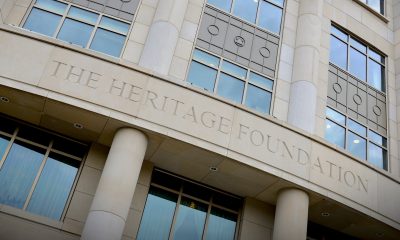Technology
FBI conducted sting operation on Huawei at CES: report


Image: Jaap Arriens/NurPhoto via Getty Images
While companies were showcasing the latest technology at CES this year, the FBI was carrying out a sting operation on the world’s second largest smartphone manufacturer.
A small U.S. startup from Illinois, Akhan Semiconductor, reached out to the FBI when the company suspected that was attempting to steal its intellectual property, according to . After months of investigating, the FBI recruited Akhan founder Adam Khan and COO Carl Shurboff to meet with executives of the Chinese smartphone giant at last month’s CES for a sting operation.
In 2018, Huawei ordered a sample of Akhan’s Miraj Diamond Glass product, a screen that the company describes as nearly indestructible. Akhan says its 6 times stronger and 10 times more scratch-resistant than the industry standard Gorilla Glass. The two companies had been in discussions since 2016 after San Diego-based Huawei engineer, Angel Han, reached out.
Akhan shipped a Miraj sample to Huawei’s San Diego testing facility in March. Huawei was supposed to return the sample within 60 days. The smartphone company missed the May deadline and ignored most of Akhan’s followup emails. Huawei finally returned the Miraj sample in August, broken in half, with shards of the glass missing.
Suspecting that Huawei was attempting to steal his company’s technology, Khan contacted the FBI. The agency took an interest in the case and spent months pouring over emails between the two companies and other documents. An FBI forensic gemology expert analyzed the broken Miraj sample and found that Huawei had likely blasted it with a 100-kilowatt laser.
This past December, with the FBI tapped into the call, Khan and Shurboff spoke to Huawei engineer Han who admitted the sample had been sent to China. This revelation put Huawei in violation of U.S. export laws. The company was specifically violating International Traffic in Arms Regulations (ITAR), which cover exported material with military application. Diamond coatings, like Akhan’s product, fall under these regulations. Akhan had warned Huawei that the company had to abide by these rules when sending the company its sample.
Han agreed to meet with Khan and Shurboff in Vegas during CES in January after the Huawei engineer continued to express interest in becoming a customer. The FBI sting was carried out at Prime Burger in the Venetian where a Bloomberg reporter listened in from a nearby gelato stand. Han and a Huawei senior supply manager both denied that the company violated ITAR and focused the conversation on a future working relationship between the two companies.
Weeks later, the FBI raided Huawei’s San Diego facility. Akhan is currently unaware of the status of the case.
Huawei has long been a U.S. target due to spying concerns. Intelligence officials have accused the company of for the Chinese government. This past summer, President Donald Trump of Huawei products over these surveillance concerns.
Earlier this month, the US the Chinese phone company with attempting to steal trade secrets from T-Mobile. Along with that inctment, Huawei was also charged with sanctions violations involving Iran. These charges came following the of Huawei’s CFO Wanzhou Meng, who faces extradition from Canada to the US over Iran sanction violations. She was with fraud and money laundering last month.

-

 Business6 days ago
Business6 days agoAPI startup Noname Security nears $500M deal to sell itself to Akamai
-

 Business6 days ago
Business6 days agoUS think tank Heritage Foundation hit by cyberattack
-

 Entertainment5 days ago
Entertainment5 days agoNASA discovered bacteria that wouldn’t die. Now it’s boosting sunscreen.
-

 Entertainment6 days ago
Entertainment6 days agoHow to watch ‘Argylle’: When and where is it streaming?
-

 Business5 days ago
Business5 days agoTesla drops prices, Meta confirms Llama 3 release, and Apple allows emulators in the App Store
-

 Business4 days ago
Business4 days agoTechCrunch Mobility: Cruise robotaxis return and Ford’s BlueCruise comes under scrutiny
-

 Entertainment4 days ago
Entertainment4 days ago‘The Sympathizer’ review: Park Chan-wook’s Vietnam War spy thriller is TV magic
-

 Business3 days ago
Business3 days agoTesla layoffs hit high performers, some departments slashed, sources say





















